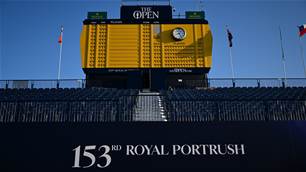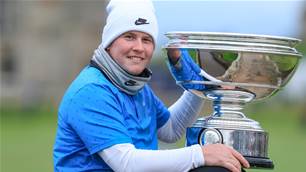The “Voice of Golf” fell silent in December 2020, but Peter Alliss will never really die.
At least that was the overwhelming sentiment in St. Andrews’ Younger Hall when a few hundred of the great man’s family, friends and colleagues gathered yesterday to pay tribute to his life and work. It was an appropriate venue. Alliss had many connections to the Open Championship and the Home of Golf, not least his five appearances in the world’s oldest and most important event at the Old Course.
As his almost peerless broadcasting career unfolded, it was easy to forget what a wonderful player Alliss was. Tee-to-green, his elegant swing produced an impact few could match, never mind beat. And despite his many humour-laden protestations, he could putt too. How else could someone notch up more than 30 victories?
Born in Berlin, Germany (he was, at the time, the heaviest baby in Europe at 14 lbs and 12 oz) where his father, Percy, was employed as a club pro, Alliss was one of golf’s greatest story tellers.
It was one of the great privileges of any golf journalist’s working life to sit down in Peter’s family home and be regaled by tales of days gone by. One of his favourites concerned the day he came home from school to find his father (four times a Ryder Cup player) entertaining a few friends around the kitchen table. Sitting there were Reg Whitcombe (1938 Open champion), Ernest Whitcombe (runner-up in the 1924 Open), Alf Padgham (1936 Open champion), Alf Perry (1935 Open champion) and Dick Burton (1939 Open champion). Quite the gathering.

The young Alliss, who would go on to record five top-10s in 24 Open appearances, as well as making eight Ryder Cup teams, also had a singular distinction as a caddie. He was on the bag of one Bobby Jones, when the 1930 Grand Slam champion played what was likely his last ever round in the United Kingdom.
“It was at Parkstone and he played with my father, Reg Whitcombe and a fellow called McGuinness,” Peter recalled. “I have a picture of them somewhere. It was just after the war because Jones was in his colonel’s uniform, his tie tucked into his shirt. I was 13 or 14 and carried Jones’ bag. I met him years later and he remembered the game if not me.”
Peter was also never afraid of being labelled old-fashioned. Witness his view on which era was actually the best in golf’s long history.
 “I do believe that the most skilful golfers were those who played between 1900 and 1920,” he said. “Look at the scores they did. J.H. Taylor won the Open at Deal around that time with scores averaging 73.5 or whatever. Look at the clubs they used. The balls weren’t round and didn’t go anywhere. The bunkers were never raked. The course was only 300 yards shorter than it is today. And the wind blew and the rain was still wet. I reckon you could take the best 20 players of today, give them the old balls and clubs in a goodish wind and they wouldn’t do what J.H. and his mates did.”
“I do believe that the most skilful golfers were those who played between 1900 and 1920,” he said. “Look at the scores they did. J.H. Taylor won the Open at Deal around that time with scores averaging 73.5 or whatever. Look at the clubs they used. The balls weren’t round and didn’t go anywhere. The bunkers were never raked. The course was only 300 yards shorter than it is today. And the wind blew and the rain was still wet. I reckon you could take the best 20 players of today, give them the old balls and clubs in a goodish wind and they wouldn’t do what J.H. and his mates did.”
ABOVE RIGHT: Alliss gets a putting lesson from Tony Jacklin in 1971. PHOTO: Getty Images.
So it was that the tributes paid in the Auld Grey Toon were an eclectic mix, representing the man himself. Although steeped in golf, Alliss was a raconteur on many subjects, some of which – in an age of increasing political correctness – occasionally got him into trouble. But it is for the words that filled our television screens that he will clearly be fondly remembered. No one ever captured more moments more perfectly.
Some examples.
In the immediate aftermath of (huge underdog) Larry Mike’s chip-in on Greg Norman to all but clinch the 1987 Masters, Alliss proclaimed, “And they say that the meek will not inherit the earth.”
Seve Ballesteros’ Open winning putt at St. Andrews was greeted with, “You think he enjoyed that one? Fantastic stuff.”
As Nick Faldo and Norman approached the 72nd green in the 1996 Masters that will forever scar the Australian’s psyche, Alliss summed up the pair perfectly. “Suddenly Faldo looks years younger,” he said. “And poor old Greg looks ready for his bus pass.”
And as Rory McIlroy walked to the 11th tee during what turned out to be a disastrous final round in the 2014 Masters, Alliss likened the young Northern Irishman’s brain as “like guacamole.”
Then there is the Alliss version of the rules of golf. It is one worthy of serious consideration:
“Play the ball as it lies. If you can’t, be sensible. And do it f****** quickly.”
Anyway, the tributes came thick and fast in the same Younger Hall where Alliss had received an honorary degree from the University of St. Andrews a decade earlier. His son, Simon, beautifully wove that fact and many others from his father’s eventful life into a rhyming saga that managed to be both funny and poignant.

But there was a common thread amongst all who spoke of their relationships with Alliss - affection and, in many cases, love for a man who, amongst his many accolades, was once president of the London Cab Drivers Golf Association and twice captain of the British PGA.
The plan was for Peter to retire at the Open that this week will dominate the headlines. Sadly, he came up a club short in that respect. Which is perhaps appropriate. Had he hit that green he would have had to putt, a task that became increasingly difficult as his playing career wound down. But while his stroke might have left him, his sense of humour never did. He was indeed a wonderful man.
Related Articles

The Aussies at The Open

The Open Preview: Back Again












